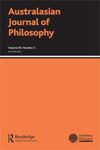When is Equality Basic?
IF 1
2区 哲学
0 PHILOSOPHY
引用次数: 0
Abstract
ABSTRACT In this paper we steer a course between two views of the value of equality that are usually understood as diametrically opposed to one another: on the one hand, the view that equality has intrinsic value; on the other, the view that equality is a normatively redundant notion. We proceed by analysing the different ways in which the equal possession of certain relevant properties justifies distributive equality. We then present an account of ‘basic equality’ that serves to single out where this equal possession is really doing normative work. Our account departs from some common assumptions about basic equality but is nevertheless plausible in as much as it assigns to that concept a precise and normatively significant role in grounding the non-instrumental value of distributive equality. By showing when, exactly, equality is basic, we are able to explain both what is right and what is wrong in each of the two opposed views of the value of equality. The argument proceeds at a fairly high level of abstraction and is therefore applicable to a number of rival egalitarian theories.什么时候平等是基本的?
本文章由计算机程序翻译,如有差异,请以英文原文为准。
求助全文
约1分钟内获得全文
求助全文
来源期刊

AUSTRALASIAN JOURNAL OF PHILOSOPHY
PHILOSOPHY-
CiteScore
2.60
自引率
0.00%
发文量
51
期刊介绍:
The Australasian Journal of Philosophy (AJP) is one of the world''s leading philosophy journals. Founded in 1923, it has been continuously published ever since. It is recognized as one of the best in the analytic tradition, but is not narrow in what it regards as worthy of acceptance. Heavily cited in the general philosophical literature, it is covered by all the major abstracting and indexing services, including the Arts and Humanities Citation Index® which provides access to current and retrospective bibliographic information and cited references found in the world''s leading arts and humanities journals. In addition to Articles and Discussion Notes, the journal publishes Book Reviews and Book Notes as well as occasional commissioned Critical Notices. The journal is read world-wide and has recently published contributions from North and South American, European and Asian as well as Australasian authors.
 求助内容:
求助内容: 应助结果提醒方式:
应助结果提醒方式:


